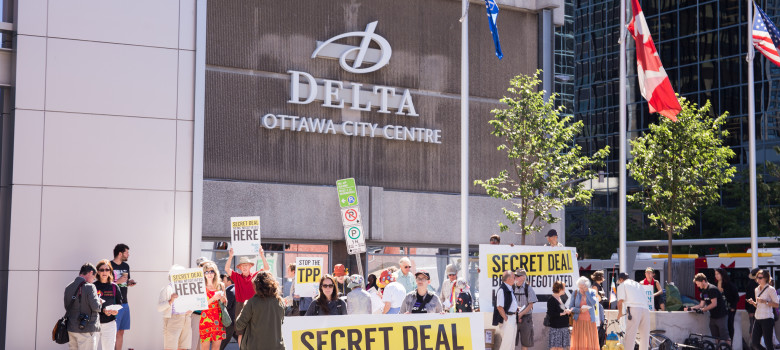Negotiations aimed at concluding the Trans Pacific Partnership are underway in Atlanta with plenty of signs that the various countries are prepared to compromise in order to reach a deal when the ministers (including Canadian International Trade Minister Ed Fast) arrive toward the end of the week. Canada has already caved on most intellectual property issues (copyright term, etc.) and Prime Minister Harper recently signaled Canada’s willingness to cave on the issues related to the auto sector and the dairy industry. Meanwhile, Japan is said to be ready to compromise on rice and there is a proposal on biologics that may not change much, but could be enough to garner support from some Asian countries.
While I think there remain questions about whether a caretaker government can/should be committing to such significant changes (the New Zealand Minister of Trade noted that Canada is negotiating as if there is no election underway), the TPP is clearly viewed as a major political prize by the Conservatives in the midst of an election campaign. The usual suspects (Chamber of Commerce, Council of Chief Executives, etc.) presumably have their press releases and quotations of support for a done deal already submitted and even opponents in the auto sector are reportedly afraid to criticize the government.
The Conservatives undoubtedly see the TPP talks as a win-win situation. If there is a deal, it provides something new to put in the political window. If not, they can claim that they stood up for Canadian interests and will not do a deal at any cost. Even with a deal, the fine print will not be public in any reasonable level of detail until after the election. In other words, the political fight will be on the concept of the TPP, not on the details. Those details can hurt the Conservatives with higher costs for health care and education, lost privacy, along with new economic challenges for sectors such as auto parts and the dairy industry. Their view is likely that the increased education and health costs are sufficiently in the future that few will care, that the privacy issues in the TPP are not well understood, and they will promise undisclosed transition support to help affected sectors.
The opposition parties face an even tougher challenge in crafting a position on the deal. The most obvious position will be to say that they favour trade agreements but can’t take a position on the TPP without seeing the details. That is reasonable response, but both supporters and opponents of the deal will want firm positions immediately. They might alternatively oppose the deal, though there will be public support for a trade deal given that few of those polled will actually know the details of the agreement (the response is really about the concept of an agreement, not the specific deal).
The third possibility is to carve out their own trade policy and point to the shortcomings in the government’s track record:
- Point to the lingering unknowns regarding the Canada – EU Trade Agreement, which was much touted by the government, but is still years from being enacted.
- Argue that support for the affected industries still hasn’t been tabled in the case of CETA and may be years from being unveiled for the TPP
- Link the problems with the TPP on issues such as privacy with Bill C-51 and talk about the undisclosed costs that come with higher pharmaceutical prices or educational materials
- Reinforce that Canada already has trade agreements with many of the key TPP countries including the U.S., Mexico, Chile, and Peru. The TPP provides marginal gains (the Japan market being the exception) at a steep cost. Canada is already negotiating a bi-lateral agreement with Japan.
- Highlight the risks associated with the investor-state dispute settlement rules that could lead to more lawsuits against the Canadian government, such as the $500 million lawsuit launched by Eli Lilly
The TPP is hardly the slam dunk that the larger corporate associations claim. The best political response may be to say so.








Pingback: Puget Sound Radio | The TPP End Game and the Canadian Election - Michael Geist - Puget Sound Radio
“The best political response may be to say so.”
The best response is to stop being political about it all, and admit all these so-called “trade deals” are a blatant, international corporate conspiracy designed to dissolve sovereignties!
Precisely!
And, with the ISDS process attached to these “trade deals”, you can expect more of this kind of thing…
https://www.techdirt.com/articles/20150929/09350032390/canada-wants-to-cut-price-worlds-most-expensive-drug-us-manufacturer-sues-to-stop-it.shtml
“[referring to TPP and TTIP], “with their establishment being negotiated behind closed doors, secretly from those very nations’ own public and business communities, as well as from the rest of the world. Other states, whose interests may be affected, have not been informed of anything, either. It seems that someone would like to impose upon us some new game rules, deliberately tailored to accommodate the interests of a privileged few, with the WTO having no say in it. This is fraught with utterly unbalancing global trade and splitting up the global economic space.”
– exerpt from recent Vladimir Putin speech at UN General Assembly
Not so clear the Atlanta talks are going so well, after all, as they’ve pushed off the “final” ministerial conclave again. There’s an excellent “Morning Trade” email available at Politico – on the same scheme as its other good “Morning” emails, that’s been focused on TPP (from the US point of view, obviously.)
Pingback: Trudeau's Endorsement of Harper's Trans-Pacific Partnership Deal Insulting